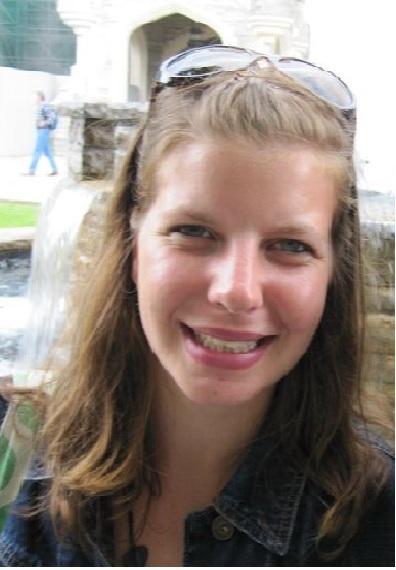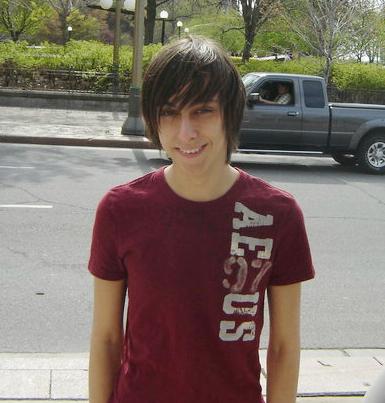
Sarah Kelly, a master's of teaching student at OISE.
Halton Catholic District School Board (HCDSB) student Brock Doiron, 17, has been trying to start a gay-straight alliance (GSA) group at his school all year, but the board has made it abundantly clear that being gay is not something you talk openly about.
“My school is not very open,” says Doiron, a Grade 12 student at Bishop Reding Catholic Secondary School in Milton. “Most kids just don’t come out. They’re afraid. When I came out in Grade 9, I was bullied pretty bad. It would have been really nice to have a GSA for support.”
Doiron even considered transferring out of the HCDSB but decided instead to stay and help make the school a more welcoming place for future gay kids.
Since Halton has banned GSAs, Doiron is now trying to start Project Harmony, an anti-discrimination group where students can talk about racism, sexism and homophobia.
In some Catholic boards in Ontario, students can form groups that are gay-positive, but they can’t have the word “gay” in the title, a loophole some people have called a sort of Don’t Ask, Don’t Tell policy.
But what message does this send to gay teens?
“Yeah, I’d rather the group be called a GSA,” Doiron says. “Kids should be able to call the group what it is and use the word ‘gay’ in the title. A GSA means acceptance. It means kids are not alone. It means they are not shunned.”
Students, gay and straight, from schools across Canada are speaking out against the HCDSB after an Xtra story broke the news on Jan 6 that the board had banned GSAs when it passed its equity and inclusive education policy in November.
The story, which quoted board chair Alice Anne LeMay comparing GSAs to Nazi groups, has mobilized students, teachers and parents to activism. Petitions have surfaced, a Facebook group has been created and comments have poured in.
“Gay-straight alliances are banned because they are not within the teachings of the Catholic Church,” LeMay said.
Sarah Kelly, a master’s of teaching student at the Ontario Institute for Studies in Education (OISE), who started the Facebook page “Fight the Halton Catholic Board’s ban on Gay Straight Alliances,” says the HCDSB has received thousands of emails protesting the ban.
Is it any wonder? The anti-gay gaffes keep coming. At the policy meeting on Jan 11 in Burlington, trustee Ed Viana told the story of Sodom and Gomorrah; afterward, trustee Jane Michael told Xtra, “I don’t think sex clubs should be in school.” Yet another trustee, Anthony Danko, admitted to Xtra he had no idea people were outraged because he doesn’t use Facebook or Twitter.
Kelly says gay students already feel alienated and suicide rates continue to climb. She says it’s shameful the board is turning its back on students at risk.
Caitlin Kennific, 17, a Grade 12 student at St Thomas Aquinas Secondary School in Oakville, wrote an editorial for her school newspaper, Aquinas OnLive, entitled “Still Not Sure If It’s Safe To Come Out Yet.”
When her friend tried to start a GSA at her school, she was told, “There’s no teacher that will support it.” Being gay isn’t something that’s talked about much in Catholic schools, she says.
“Kids are looking for a place in the school where they can safely say, ‘This is who I am’ and be accepted,” she says. “They should be able to call the groups what they are: gay-straight alliances. I really hope the school board sees this is about accepting people for who they are.”
Noa Mendelsohn Aviv, director of the equality program at the Canadian Civil Liberties Association, says she hasn’t heard any justifiable reason for not allowing students to get together in GSAs or other gay-positive groups.
“There’s another piece to this that many people would like to sweep under the carpet,” she says. “A general inclusive tolerance policy that omits the word ‘gay’ is itself a stigma, and one we need to be vigilant about. [If] you want to create a safe place for LGBT kids in high schools, then they need to be able to talk about their identity in a positive, supportive atmosphere.”
From a philosophical perspective, she says, boards are skirting human rights by censoring the word “gay.” However, she’s unsure whether the argument could succeed in court.
“I would submit that there is something problematic from a freedom-of-expression perspective and an equality perspective if a group is prohibited from stating who they are,” she says. “Not being able to call the group what it is is still a limitation. It’s a restriction of their freedom of expression and their right to equality.”
“There’s something deeply problematic here that the law should be seeking to address,” she says.
Students will find out at a board meeting in Burlington Jan 18 whether the HCDSB will lift its ban on GSAs and scrap the current equity policy. A protest is planned to send a message to the board that anti-gay policies have no place in schools.

 Why you can trust Xtra
Why you can trust Xtra


